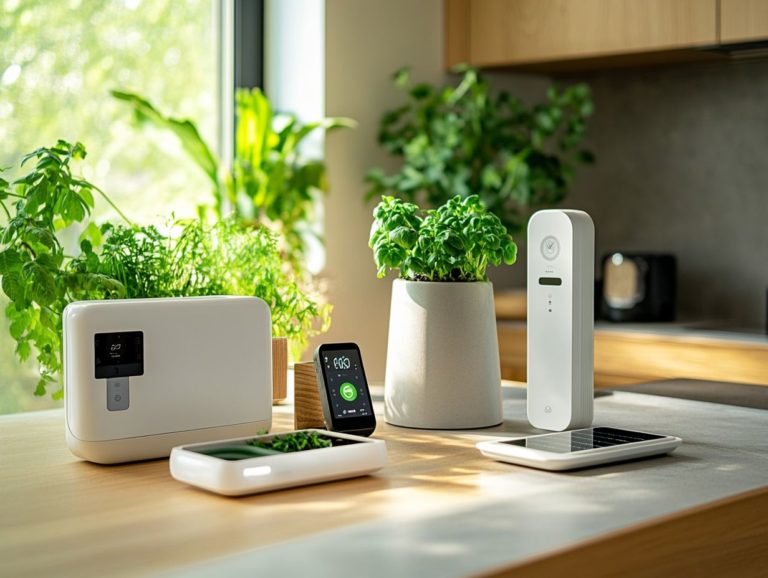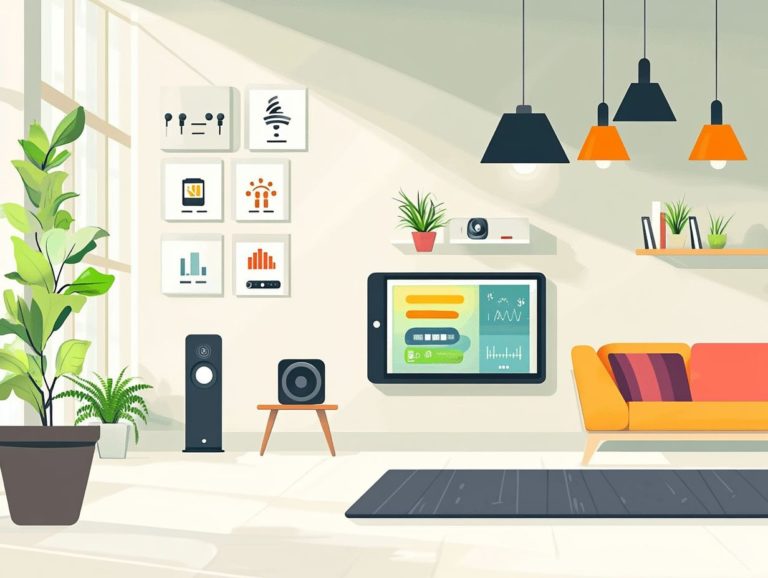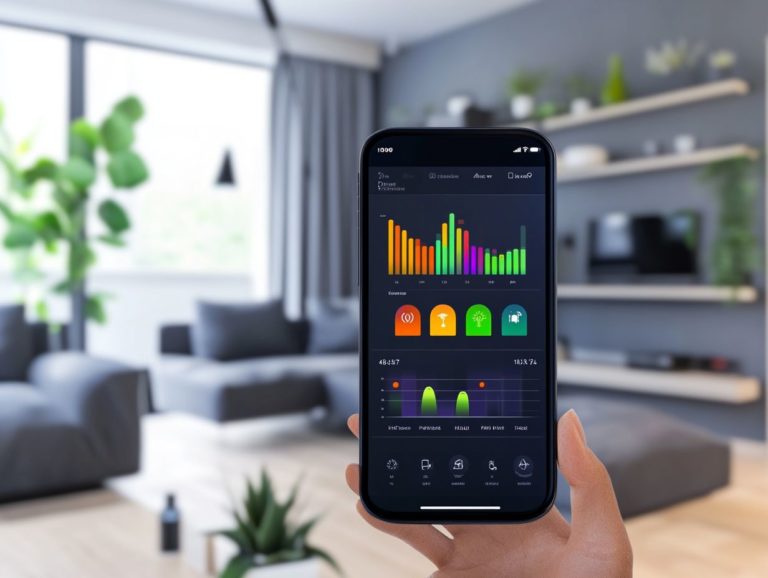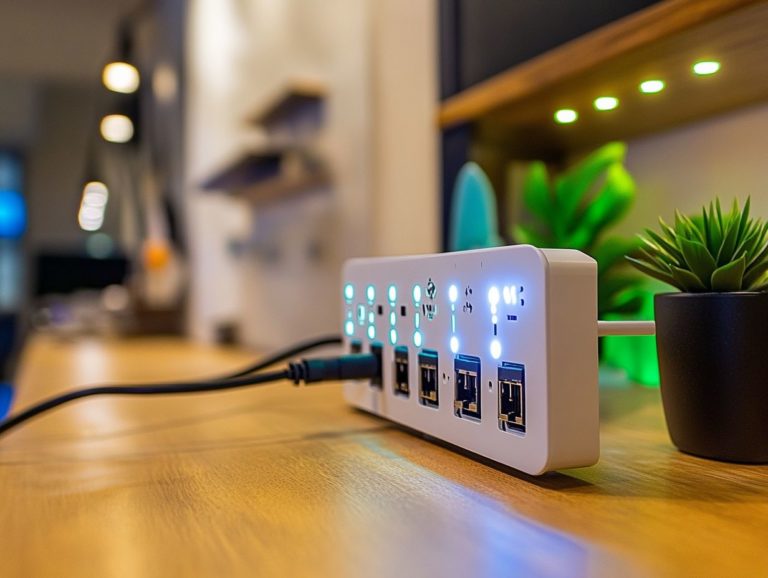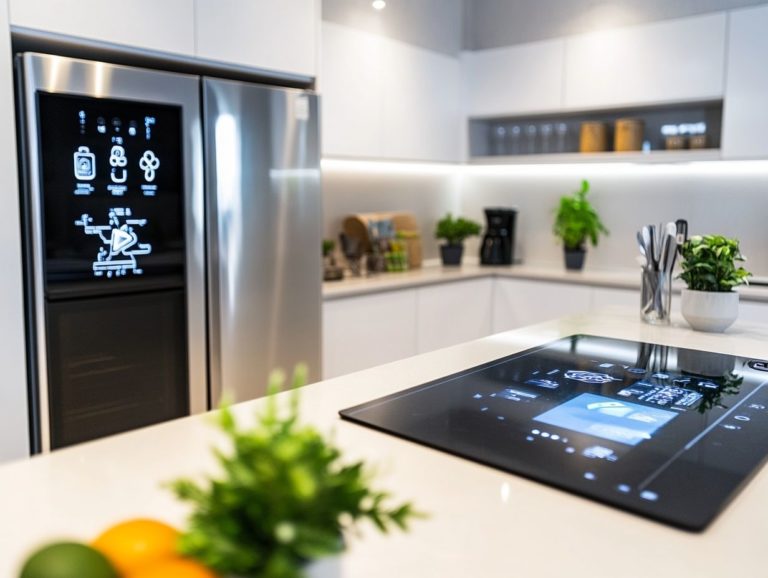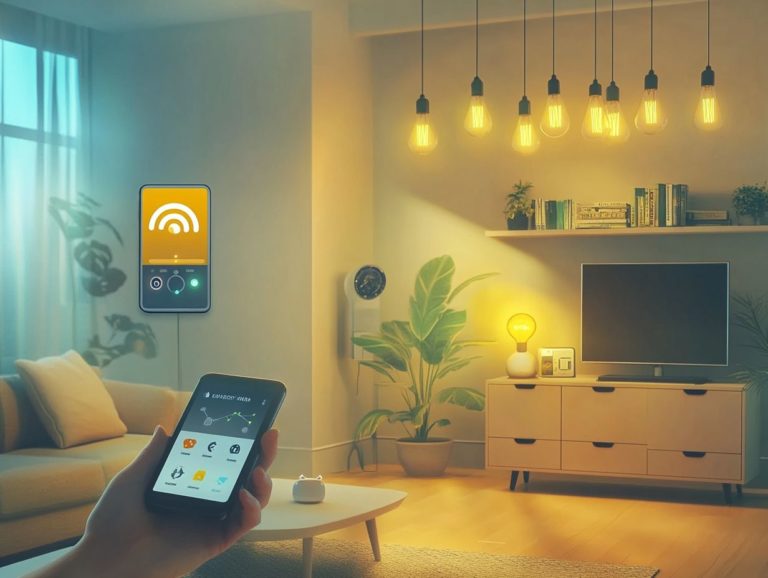Smart Home Technology for Reducing Environmental Impact
As the world confronts pressing environmental challenges, the way you build and maintain your home is coming under keen scrutiny. Traditional homes often play a significant role in energy use and waste production, contributing to the strain on our planet. Issues like climate change and the depletion of energy resources are directly tied to how we manage our living environments.
However, the rise of smart home technology offers you an exciting opportunity to lessen these impacts. Picture this: smart thermostats that not only save energy but also lower your bills! Solar panels that capture renewable energy can help you create a more sustainable future for your living space. You can also incorporate smart appliances and energy-efficient lighting like LED light bulbs to further enhance your home’s sustainability.
Delve into the benefits, costs, and examples of smart home technologies that have the potential to transform your home into an eco-friendly sanctuary. Take action now to embrace sustainable living and innovative solutions like smart homes!
Contents
- Key Takeaways:
- The Environmental Impact of Traditional Homes
- Benefits of Smart Home Technology for the Environment
- Implementing Smart Home Technology
- Examples of Smart Home Technology
- Future of Smart Homes and Environmental Sustainability
- Frequently Asked Questions
- 1. What is smart home technology and how can it reduce environmental impact?
- 2. How does smart home technology help conserve energy in a household?
- 3. Can smart home technology be integrated with renewable energy sources?
- 4. Are there any cost savings associated with using smart home technology for reducing environmental impact?
- 5. Is smart home technology only beneficial for reducing energy consumption?
- 6. How can I get started with incorporating smart home technology for environmental benefits?
Key Takeaways:
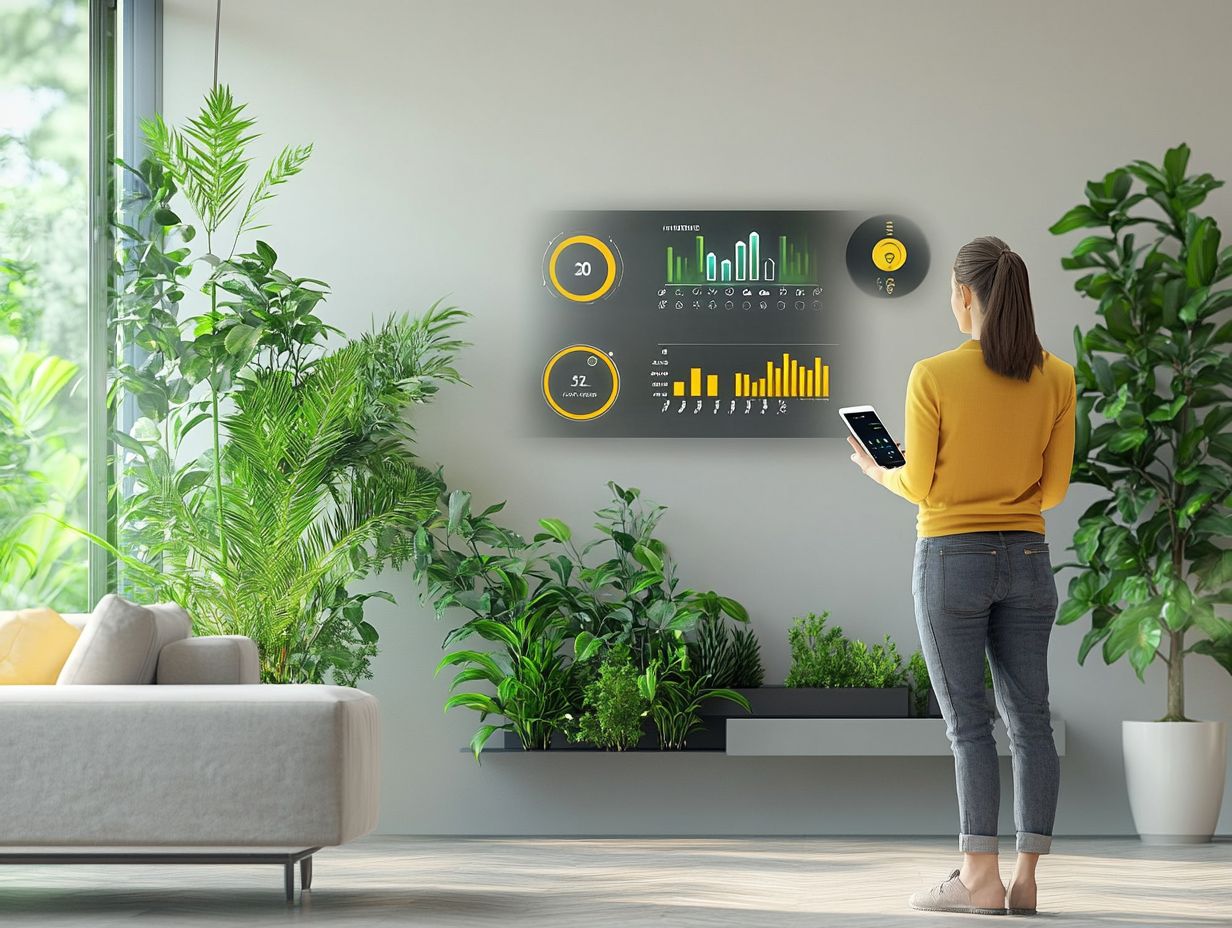
- Smart home technology can significantly reduce energy use and minimize waste production, making it a valuable tool for reducing environmental impact.
- Implementation of smart home technology may come with initial costs and considerations, but the long-term benefits for the environment can outweigh these expenses.
- The future of smart homes and environmental sustainability is promising with advancements in technology, such as smart thermostats, solar panels, smart shades, and smart appliances, leading the way.
The Environmental Impact of Traditional Homes
Traditional homes carry a considerable environmental impact, largely stemming from their elevated energy use and waste generation. Often constructed with outdated systems and materials, these older structures significantly contribute to a heightened carbon footprint, worsening climate change and harming the environment.
As you navigate the complexities of contemporary global challenges, such as rising temperatures and resource depletion, it becomes essential to grasp how traditional homes play a role in these pressing issues. By critically assessing energy usage, waste output, and overall environmental footprints, you can help forge a path toward more sustainable living practices and embrace innovative solutions like smart homes. Implementing home automation systems and smart meters can facilitate better monitoring and reduction of your environmental impact, paving the way for the future of home energy management with smart tech.
Energy Use and Waste Production
In traditional homes, energy use often borders on wastefulness, leading to inflated energy bills and a larger carbon footprint. This inefficiency can be traced back to outdated heating, ventilation, and air conditioning (HVAC) systems that struggle to effectively heat or cool your living spaces, resulting in both energy loss and discomfort.
Inadequate or improperly installed insulation allows heat to escape during colder months and seep in during warmer seasons, exacerbating energy waste. Relying on these antiquated systems not only drives up your utility costs but also increases the amount of waste generated, as you resort to inefficient energy sources that further harm the environment.
By addressing these issues, you can not only reduce your energy expenses but also play a pivotal role in minimizing your overall environmental impact. Utilizing smart power supply systems and smart outlets can further enhance your home’s energy efficiency.
What is Smart Home Technology?
Smart home technology embodies the seamless integration of smart devices that connect to the internet for enhanced control and automation, elevating both energy efficiency and convenience in your everyday life.
This innovative approach transforms your traditional residence into an interconnected environment where various smart appliances communicate effortlessly. Companies like Google Nest and Savant offer advanced home automation systems that enhance both comfort and efficiency.
Take smart thermostats, for example. They collaborate with weather sensors and your personal preferences to optimize heating and cooling systems, leading to significant reductions in energy consumption. You can also manage smart lighting and security systems remotely, giving you the power to monitor and adjust your home’s status from virtually anywhere. For instance, systems like Lutron HomeWorks and Amazon Alexa can seamlessly integrate with your smart home setup, providing unparalleled convenience.
By harnessing the capabilities of these interconnected technologies, you not only enhance your convenience but also gain the peace of mind that comes from knowing your home is operating at peak efficiency while minimizing its environmental impact.
Benefits of Smart Home Technology for the Environment
Smart home technology offers exciting benefits for the environment! By embracing this innovation, you can achieve significant energy savings, effectively lowering your overall energy consumption and minimizing the associated environmental impact.
Reducing Energy Consumption
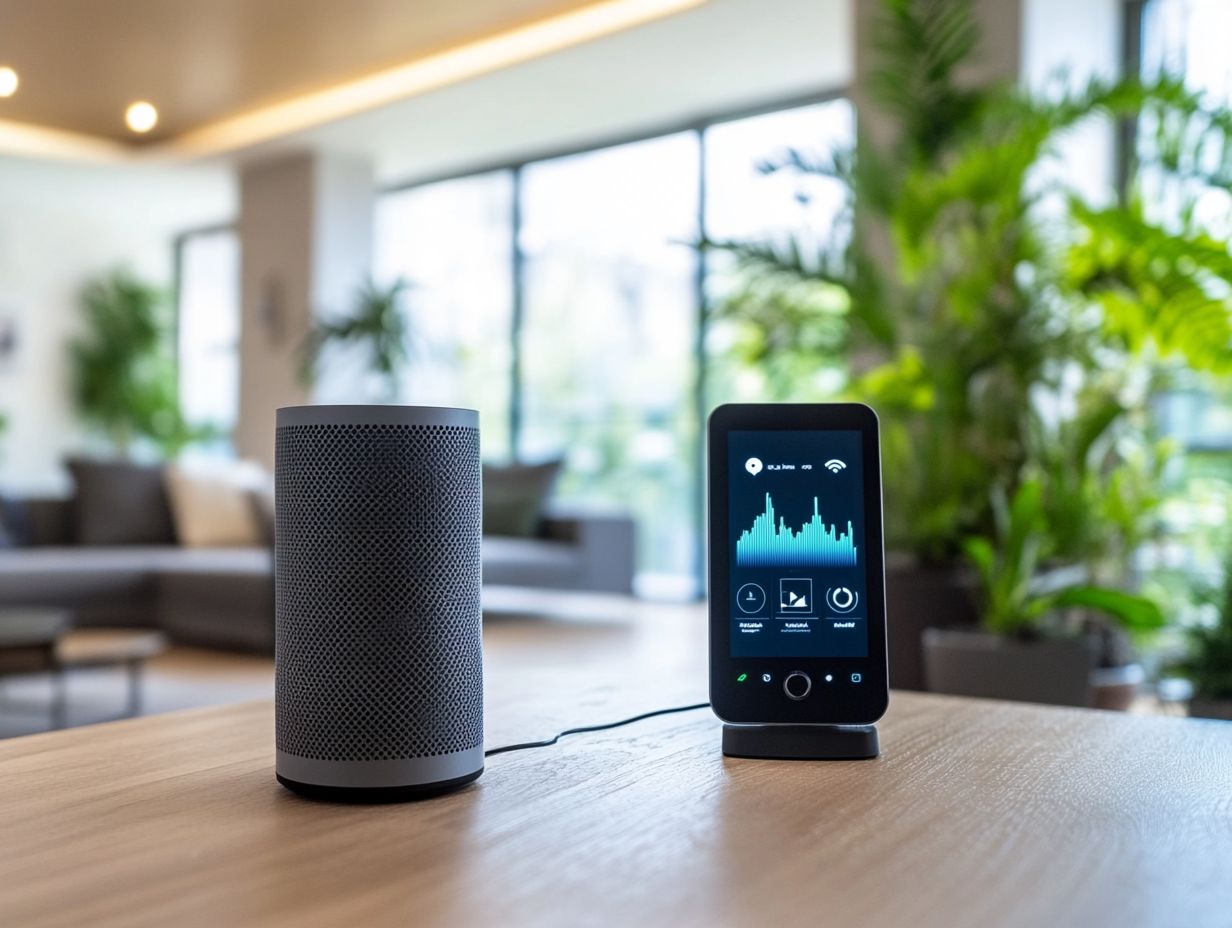
One of the standout benefits of smart home technology is its remarkable ability to drastically reduce energy consumption, thanks to devices like smart energy monitors and smart thermostats. These systems contribute significantly to lowering your carbon footprint and promoting a more sustainable lifestyle.
These innovative tools offer real-time insights into your energy usage, giving you the power to make informed choices about how you consume energy. For example, smart energy monitors can pinpoint peak usage times and suggest strategies to lower your electricity bills, such as shifting activities like running the dishwasher or washing machine to off-peak hours.
Furthermore, smart thermostats allow you to create tailored heating and cooling schedules that align with your daily routines, ensuring you don’t waste energy when your home is empty. This harmonious blend of comfort and efficiency can lead to significant cost savings and a more sustainable lifestyle. For instance, exploring the benefits of smart home automation for energy use can further enhance your energy efficiency. Companies like Tesla Powerwall offer innovative solutions for energy storage, further optimizing your energy consumption.
Minimizing Waste Production
Smart home technology helps reduce waste by optimizing water usage through advanced systems like smart irrigation and smart water systems.
These innovative solutions harness real-time data to make informed adjustments in water distribution, ensuring that every precious drop is utilized efficiently. For example, smart irrigation systems can automatically tweak schedules based on weather forecasts, drastically cutting down on unnecessary watering and runoff. Advanced systems like Savant and Josh.ai provide unparalleled control over your home’s water resources, making them more user-friendly and effective.
On the other hand, smart water systems come equipped with sensors that monitor your usage patterns and detect leaks early, giving you the power to address issues promptly and conserve valuable resources. By integrating these technologies into your home, you can save money on utility bills while also contributing to broader environmental goals by significantly reducing overall water waste.
Implementing Smart Home Technology
When implementing smart home technology, it is essential to thoughtfully consider the costs alongside the various factors that influence both home integration and user-friendliness. Each decision shapes the overall experience, ensuring that your smart home not only meets your needs but also enhances your lifestyle.
The integration of smart window treatments and smart outlets can further boost your home’s efficiency and convenience.
Start your journey towards a smarter, more efficient home today!
Costs and Considerations
The costs associated with smart home technology can vary significantly, but they often represent a worthwhile investment that leads to long-term savings on energy bills and maintenance. Integrating smart bulbs and energy-efficient light bulbs can reduce your energy costs and environmental impact.
As you explore the range of available options, it s essential to consider both the initial costs such as the purchase of smart devices and installation costs and the ongoing benefits that may accumulate over time. Investing in systems that enhance energy efficiency, like smart thermostats and lighting controls, not only helps reduce your monthly utility expenses but can also potentially boost your property’s value.
When evaluating this investment, take the time to assess factors such as compatibility with your existing home infrastructure, warranties offered by manufacturers, and the potential for future upgrades or expansions. Balancing initial costs with long-term savings helps you make an informed decision about integrating these advanced technologies into your living space.
Examples of Smart Home Technology
Consider the transformative potential of smart home technology, which encompasses smart thermostats, solar panels, and an array of energy-efficient appliances. These innovations have the ability to elevate a traditional home into a sophisticated smart home, seamlessly enhancing comfort, efficiency, and sustainability. Utilizing smart shades and smart window treatments can further optimize your home’s energy efficiency and contribute to a more sustainable lifestyle.
Smart Thermostats
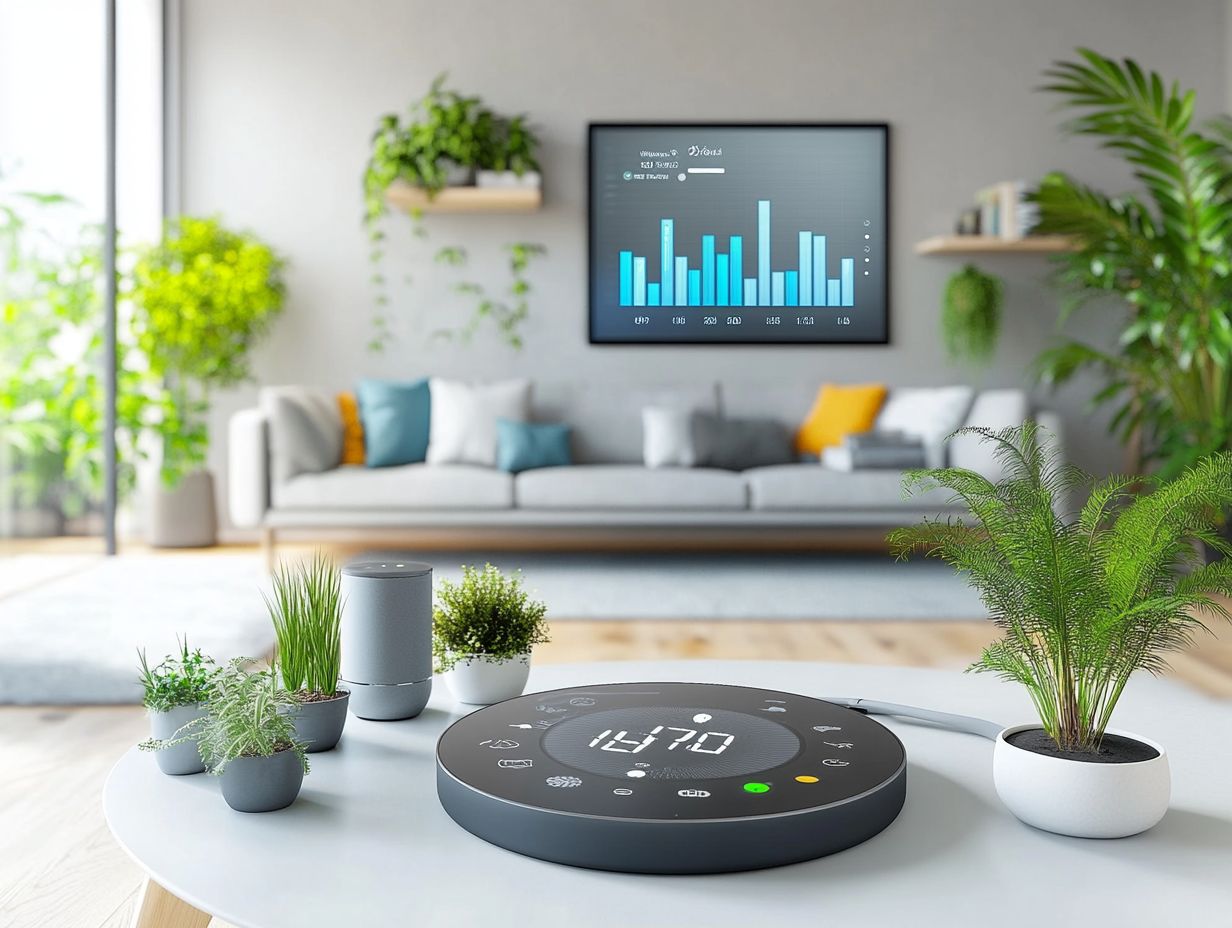
Smart thermostats play a crucial role in modernizing your HVAC system, elevating both energy savings and the overall comfort of your home. Brands like Google Nest, Savant Multistat, and TSP offer advanced solutions that can seamlessly integrate with your existing setup.
These devices learn your preferences. They automatically adjust temperatures based on real-time data to optimize heating and cooling.
With built-in sensors and Wi-Fi connectivity, they effortlessly communicate with your smartphone and other smart home gadgets, giving you the power to monitor and control your environment remotely through specialized apps. Additionally, smart meters can provide detailed insights into your energy consumption patterns.
This level of automation not only enhances your energy efficiency but also leads to substantial savings on your utility bills. Many smart thermostats come equipped with energy reporting features, offering you valuable insights into your energy consumption patterns and suggesting strategies to further minimize waste while maximizing your comfort.
Solar Panels
Solar panels are a remarkable leap forward in energy-efficient technology, allowing you to harness renewable energy while cutting both your energy costs and carbon footprint. The Tesla Powerwall, for example, offers advanced energy storage solutions that can further optimize your use of solar energy. Now is the perfect time to invest in renewable energy!
These panels do more than just convert sunlight into usable electricity; they integrate effortlessly with the rising trend of smart home technology, giving you the power to optimize your energy consumption with intelligence and ease. By incorporating solar energy systems alongside smart meters and home automation devices, you can monitor your energy usage in real time, enabling you to make informed decisions that enhance efficiency.
With the capability to store excess energy generated during the day, you have a sustainable power source at your disposal during peak demand times. The strong connection between solar panels and smart technology boosts your energy resilience. It also leads to significant financial savings and helps reduce your environmental impact. In doing so, you become a champion for a more sustainable future.
Smart Appliances
Smart appliances are designed to be energy-efficient and user-friendly, providing you with unparalleled convenience while minimizing their impact on the environment.
With an ever-expanding selection at your fingertips, these innovative devices have transformed the way you manage energy consumption in your home. Imagine smart refrigerators that adjust temperatures automatically. Washing machines can also fine-tune water usage based on load size. To understand more about how these technologies affect your expenses, check out the impact of smart home solutions on energy bills. You’ll be amazed at the incredible features these appliances offer!
These appliances not only simplify your daily tasks but also significantly lower your energy costs. They are an ideal choice for those who care about sustainability. By incorporating smart technology, they enable you to monitor and control energy usage from anywhere, which is a key aspect of how to reduce energy costs with smart tech, encouraging more mindful consumption and ultimately helping to create a greener planet.
Future of Smart Homes and Environmental Sustainability
The future of smart homes is intricately tied to advancements in smart technology and environmental sustainability, signaling a remarkable shift in the way you interact with your living spaces.
As these innovations unfold, you ll find that your home evolves into a more intuitive, responsive environment that aligns with both your lifestyle and your commitment to sustainability.
Potential Impact and Advancements
The potential impact of advancements in smart technology could truly revolutionize your approach to climate change, significantly enhancing energy savings across a multitude of sectors.
In the years ahead, you can expect innovations like smart grid systems, which manage energy in real-time, to emerge. These systems will play a crucial role in optimizing your energy use. Imagine integrating artificial intelligence, which helps machines learn from data, into your home automation systems. This promises to reduce energy waste by intelligently adjusting heating and lighting based on occupancy patterns. Additionally, exploring smart home automation and energy savings can further enhance your energy efficiency.
Advancements like smart solar panels and energy storage solutions will give you and your business the power to harness renewable energy more efficiently. These new technologies promise to lower your energy bills and contribute substantially to reducing carbon footprints. Additionally, incorporating the top smart home devices for eco-friendly living underscores the vital role that continuous progress in smart technology will play in fostering a sustainable future for all.
Frequently Asked Questions
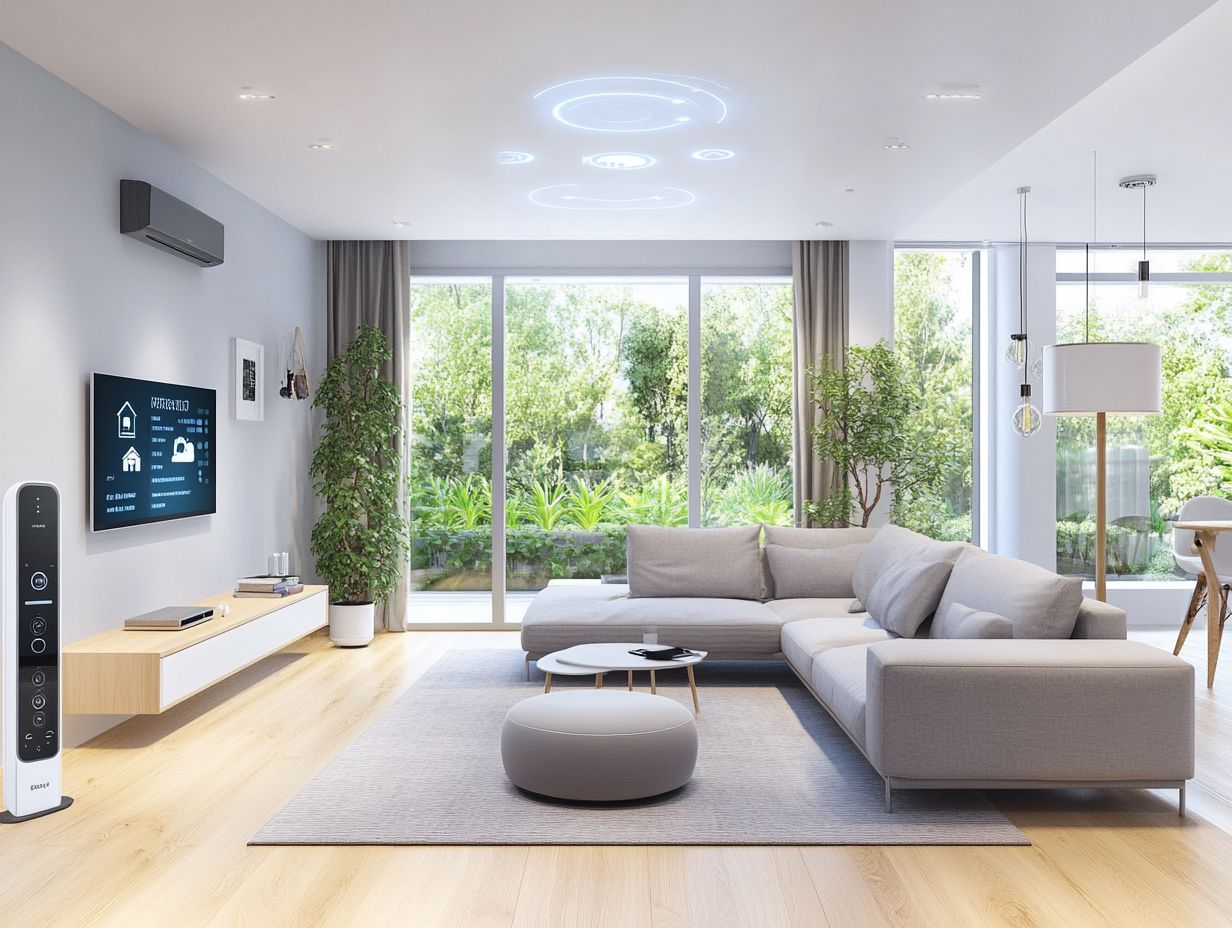
1. What is smart home technology and how can it reduce environmental impact?
Smart home technology refers to a system of automated and connected devices that allow homeowners to control and optimize their household functions, such as lighting and temperature, through a central system. By using energy-efficient settings and monitoring energy consumption, smart home technology can help reduce environmental impact.
2. How does smart home technology help conserve energy in a household?
Smart home technology can help conserve energy in various ways, such as automatically turning off lights and appliances when not in use, optimizing heating and cooling systems, and providing real-time energy consumption data for better management. By efficiently managing energy usage, smart home technology can significantly reduce environmental impact.
3. Can smart home technology be integrated with renewable energy sources?
Yes, smart home technology can be integrated with renewable energy sources such as solar panels or wind turbines. This allows homeowners to monitor their energy usage and produce clean energy to power their household, further reducing environmental impact.
4. Are there any cost savings associated with using smart home technology for reducing environmental impact?
Yes, there are potential cost savings associated with using smart home technology for reducing environmental impact. By optimizing energy usage and reducing electricity bills, homeowners can save money in the long run. Some governments also offer incentives and rebates for using energy-efficient technology, making it a cost-effective option.
Discover how smart appliances can transform your home today!
5. Is smart home technology only beneficial for reducing energy consumption?
No! Smart home technology can also help you save water. It monitors and controls watering systems, detects leaks, and provides insights on water usage.
This tech can improve indoor air quality too. It manages ventilation and air purification systems, which all together reduces your household’s environmental impact.
6. How can I get started with incorporating smart home technology for environmental benefits?
You can start by purchasing individual smart devices or investing in a complete system. Research options that best fit your needs and budget.
Consider consulting a professional or attending workshops. These resources will help you understand and use the technology effectively!

